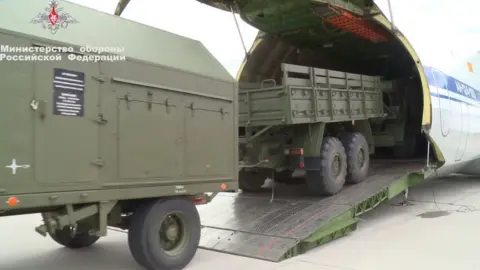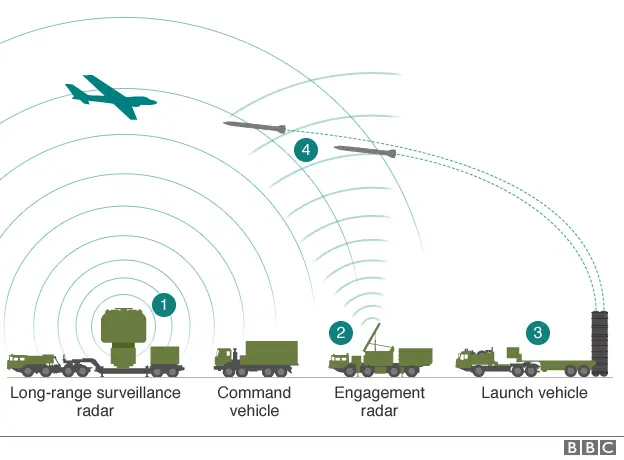Turkey defies US as Russian S-400 missile defence arrives
Turkey has received the first parts of a Russian S-400 missile defence system despite opposition from the US.
The shipment arrived in an airbase in the capital Ankara on Friday, the Turkish defence ministry says.
The move will anger the US, which has warned that Turkey cannot have both the S-400 anti-aircraft defence system and US F-35 fighter jets.
Turkey and the US are Nato allies - but Turkey has also been establishing closer links with Russia.
A Nato official told the AFP news agency that the body was "concerned" about Turkey's acquisition.
What have both countries said?
Acting US Secretary of Defense Mark Esper said on Friday that the US position had not changed.
Republican and Democratic leaders of the US Senate Foreign Relations Committee called the Turkish action "a troubling signal of strategic alignment with Putin's Russia".
Mr Esper spoke with his Turkish counterpart for 30 minutes but a planned Pentagon briefing in response to the moves by Turkey was called off.
The Turkish Defence Minister Hulusi Akar said the two men had discussed the purchase of the S-400 missile system, but insisted that it did not mean a change of Turkey's strategic orientation.
Mr Akar said the pair also discussed a bid to acquire US Patriot air defence systems.
What's the argument about?
Turkey has signed up to buying 100 US F-35 warplanes and has invested heavily in the F-35 programme. Turkish companies produce 937 of the plane's parts.
But Turkey has also pursued an increasingly independent defence policy amid strained ties with the US and Europe. It has purchased Russia's advanced S-400 air defence system for $2.5bn and sent members of its armed forces to Russia for training.
US defence officials said the S-400 is incompatible with the wider Nato air-defence system in the region.
 Russian Ministry of Defence
Russian Ministry of DefenceThe officials said they did not want the F-35 jets to be near S-400 systems because they feared Russian technicians would be able to access the F-35's vulnerabilities.
The US warned that it would exclude Turkey from the F-35 programme if the S-400 deal went ahead, and warned that it could impose economic sanctions.
Turkey has argued that the two systems would be located in separate locations, and that the US was slow to offer an alternative missile defence shield.
President Recep Tayyip Erdogan said after a meeting with US President Donald Trump that he believes the US will not impose sanctions.


This looks set to prompt a major rift between Washington and one of its key Nato allies. For an alliance member to buy this kind of equipment from Russia is almost unprecedented.
The US has already halted deliveries of the aircraft to Turkey and suspended the training of Turkish pilots.
Plans are also under way to remove Turkey from the programme altogether. It manufactures part of the F-35 and is due to be a regional hub for maintenance of the aircraft.
Turkish President Recep Tayyip Erdogan seems to believe that, whatever the Pentagon may say, Donald Trump himself is less hostile to the purchase of the Russian missiles.
A major test of ties between Ankara and Washington beckons.

How important is Turkey?
Turkey has the second-largest army in Nato, a 29-member military alliance.
It is one of the US's key allies, and is located in a strategic position, sharing borders with Syria, Iraq and Iran.
It has also played an important role in the Syria conflict, providing arms and military support to some rebel groups.
However, it has seen relations deteriorate with some Nato members and the EU, who have accused Mr Erdogan of adopting an increasingly authoritarian style following a failed coup in 2016.

How does the S-400 work?

- Long-range surveillance radar tracks objects and relays information to command vehicle, which assesses potential targets
- Target is identified and command vehicle orders missile launch
- Launch data are sent to the best placed launch vehicle and it releases surface-to-air missiles
- Engagement radar helps guide missiles towards target

